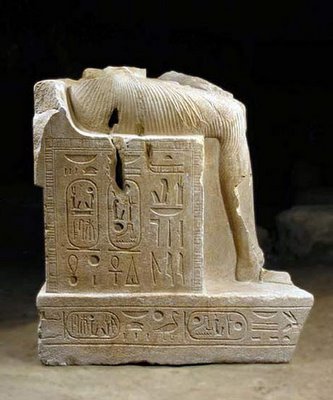
French archaeologists found a huge temple to the sun god Re under a Cairo suburb yesterday. (You can see one of the statues they found above. It's a rare one of a pharoah, in this case Ramses the Great, dressed as a high priest.) In the meantime, British archaeologists found a private chapel used by Henry VIII and other royalty under a parking lot in Greenwich, England.
Apparently all sorts of treasures lurk under our existing cities, waiting to be found. Beneath your feet could lie the evidence of long dead civilizations -- their places of worship, their burial sites, their sewers, their bedrooms. How fricking cool is that?
I spotted the news of the Egyptian sun temple on www.nationalgeographic.com. Per their article:
The discovery of the sun temple may shed light on the status of Heliopolis in ancient Egypt. "We do not know enough about Heliopolis, which was one of the main cities in Egypt and moreover a religious and, let us say, intellectual center," said French archaeologist Alain Zivie, leader of a team that has been excavating Saqqara, the cemetery of the ancient Egyptian city of Memphis, for more than two decades.
Zivie says the discovery also shows that much of ancient Egypt's treasures are still buried under modern cities, particularly Cairo and its suburbs.
"Cairo is the child of three cities: Memphis, [the Roman fortress of] Babylon of Egypt, and Heliopolis," Zivie said. "Expanding more and more, it swallows now its three mothers, especially Babylon and Heliopolis. But these [ancient cities] are not completely lost. They continue to exist in the underground Cairo."
Leo Depuydt, an Egyptologist at Brown University in Providence, Rhode Island, agrees. "The recent find of a giant temple built by Ramses II, ancient Egypt's greatest builder pharaoh, in Cairo again reminds us of how archaeological discovery would increase exponentially—almost beyond imagination—if digging under urban centers and dismantling buildings of later date ever becomes, technically and politically, even more feasible," he said.
But how to dig in places where people live without completely uprooting their lives? How to balance the needs of the living with the desire for historical and anthropological knowledge? Imagine the riches to be found if some genius engineered a marvel that would allow scientists to dig underground without disturbing the lives of those above. Scientists -- get cracking!
No comments:
Post a Comment